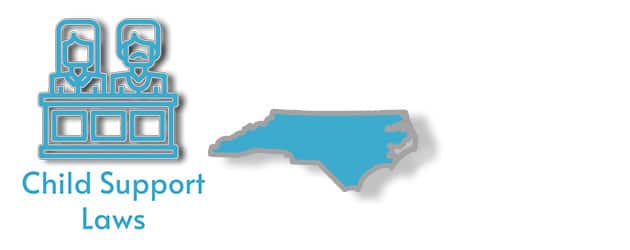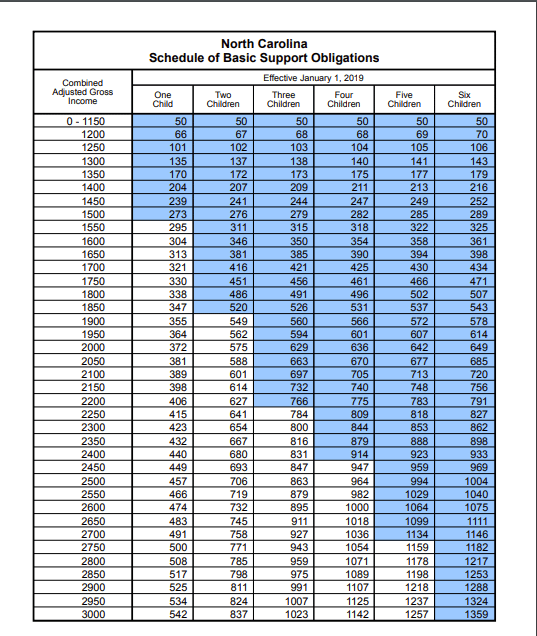
Everything you need to know about North Carolina child support laws, updated for 2020.
North Carolina child support guidelines work under the assumption that upkeep is the responsibility of both parents. Whether married or unmarried.
But in practice. The non-custodial parent is the one that pays child support. The reason is. The courts assume that the custodial parent spends his/her share directly on the child. This situation raises several questions. For example, is my child support order fair? What is the punishment for disobeying child support orders? And what can you do if your partner willfully and knowingly decides not to pay child support?
Or maybe he hightailed it out of the state. Find all the answers below and plenty more you should know.
How to apply for child support in North Carolina
In North Carolina, the Division of Social Services Child Support Services (NCDHHS), through the CSS, Provides child support services to parents, alleged fathers, and minors including, child support application, location of non-custodial parents, paternity establishment, support enforcement, and support modifications.
To apply for child support, you must first download and complete this form. Then file it at your local child support services office or Apply online here. The service number is 1-800-992-9457.
What to remember:
- Families receiving Medicaid, foster care, or TANF, do not have to pay the $25 service fee.
- Non-assistance support cases pay a non-refundable $35 fee annually.
- The DHSS may pay or charge the non-custodial parent court fees and the custodial parent’s attorney fee.
- Child support is available to custodians regardless of gender, so yes, custodial fathers can receive child support.
When applying, you will need both parents’ names, addresses(es), social security number, current or former employer, standing support protective, divorce or separation orders, income information, birth certificate(s), or any other relevant document.
The logic is, the more information you can provide, the easier it will be to process your support order.
How is paternity established in North Carolina?
Before the DHHS takes any action to enforce child support, the law requires a paternity test. That is because in North Carolina, signing a birth certificate is not a valid proof of paternity. Thus, paternity in North Carolina is established either via civil action or by signing the affidavit of parentage.
‘Affidavit of parentage’ is a sworn statement Infront of witnesses after childbirth, whereas a civil action is a court-ordered/voluntary blood or genetic marker testing.
How is child support calculated in North Carolina?
Effective January 1st, 2019, North Carolina general statutes require judges to prescribe uniform presumptive guidelines in the determination of child support obligations. The state revises these guidelines periodically, do not forget.
How is child support determined under North Carolina child support guidelines?
The courts provide a calculator.
The linked state calculator requires the number of children, monthly gross income(s) of both parents, pre-existing child support payments, number of other children, work-related child-care costs, insurance premium costs, and extraordinary expenses to complete.
You may also use depending on your circumstances:
- Worksheet A child support obligation primary custody.
- North Carolina Child Support Worksheet B (shared or joint custody)
How does the judge allocate parental obligation?
To determine your presumptive obligation, use the relevant worksheet. Then find the resulting figure on the North Carolina Schedule of Basic Support Obligations.

Note that the court only uses these guidelines when they serve the best interest of the child. That means some cases require the judge to deviate, for example, if the ordered amount is unfair to one party. The court may deviate.
Other grounds for deviation in North Carolina includes:
- The standard of living the children enjoy.
- Extraordinary travel or healthcare expenses related to the child.
- Special education fees.
- The parent’s income level.
- other factors that impact the support order.
How to modify child support in North Carolina
In North Carolina, the CSE (Office of Child Support Enforcement), automatically reviews support orders every 3 years. However, the law allows parents to petition for reviews whenever a substantial change in circumstances that affect the child occurs.
To begin the process, either call 1-800-992-9457 or mail a petition for modification to N.C. CSS. PO BOX 20800, Raleigh, NC 27619-0800.
You may also apply online here.
What to remember:
- You must file a written request with the court to change existing orders.
- A substantial change in financial circumstances means a 15% increase or decrease in parental income.
- A significant increase or decrease in parental income is grounds for modification.
- Voluntary unemployment or underemployment; are not grounds for support order modifications.
- A change in the custody arrangement may warrant support order changes.
- Remarriage does not directly impact child support orders.
- No arrears accrue if the paying parent is in jail or prison.
- Parents can modify child support agreements without needing to go to court.
- The CSE may assist Incarcerated parents with fatherhood programs, work release, and job link centers.
Visit your local support offices, the family court where your order was issued, or contact a family court attorney in your area.
What happens if you do not pay child support in North Carolina?
A Support order establishment does not guarantee timely payments. As a result, the CSS utilizes the following tools to ‘persuade’ parents to respect court orders.
- Income withholding: such orders require the paying parent’s employer to deduct a specified amount from the caregiver’s salary, wages, or income(s). this order is also used to collect upkeep from worker’s compensation, veteran’s disability, and all relevant benefits.
- Monthly billing: instead of a withholding order, the CSE may also bill the paying parent monthly.
The CSE may also:
- Intercept the payor’s state, local, or federal tax returns or lottery winnings.
- Passport revocation if back support owed surpasses $2500.
- Apply levies on property, or the payors’ bank account and other assets.
- The CSE may revoke or deny licenses including the paying parent’s business, professional, or driver’s license until he or she pays child support.
- Credit bureau reporting, fines, attorney fee compensation, seizure of insurance settlement, may also be employed by the CSE.
Contempt of court charges in North Carolina
If the payor refuses to pay, the receiving parent or agency can petition the court to find him or her in contempt. If the court finds a parent in contempt, it means that you willfully and knowingly failed to provide support to your child (ren).
The remedies listed above apply to these charges. But, depending on the circumstances of the case. The parent may also pay a fine, do time behind bars, or both.
What do I mean?
Criminal nonsupport North Carolina
Chapter 14-Criminal Law. Article 40 Protection of the family 14-326.1-1 reads, quote;
” If any person being of full age, and having sufficient income after reasonably providing for his or her own immediate family shall, without reasonable cause, neglect to maintain and support his or her parent or parents, if such parent or parents be sick or not able to work and have not sufficient means or ability to maintain or support themselves, such person shall be deemed guilty of a Class 2 misdemeanor; upon conviction of a second or subsequent offense such person shall be guilty of a Class 1 misdemeanor.”
Also: 2005 North Carolina Code – General Statutes § 49-2.
“Any parent who willfully neglects or who refuses to provide adequate support and maintain his or her illegitimate child shall be guilty of a Class 2 misdemeanor. A child within the meaning of this Article shall be any person less than 18 years of age and any person whom either parent might be required under the laws of North Carolina to support and maintain if such child were the legitimate child of such parent”
The maximum penalty for a class 2 misdemeanor in North Carolina is a $1000 fine and or 60 days in jail. The judge may also order between one to sixty days of community service.
On the other hand, a class 1 misdemeanor carries a maximum of 120 days behind bars, license revocation, and or a discretionary fine.
When does child support end in North Carolina?
According to stat 50-13.4, parents in North Carolina must pay child support until the dependent’s 18th birthday or high school graduation. What that means is your child support order may last until the child is 20, or longer if the parents agreed to provide college or university tuition.
That makes it very important to read and understand before you sign any agreement.
Emancipation of minors in North Carolina
North Carolina child support laws provide an avenue for emancipation for minors who are at least 16 years of age. However, age is not the only requirement.
Meaning, for a successful petition, the minor must have lived in North Carolina or on federal land in the state for at least six months. The minor must also have legal income and the capacity to support him/herself.
Do not forget that the judge must base his/her decisions on the best interests of the child. Meaning, the courts do not approve all petitions. So, we advise you to consult with a family court attorney to see if you qualify.
Overall, you can work with an attorney full time or part-time when in pursuit of a child support order, modification, or emancipation.
More North Carolina Laws
- Murder Sentencing Guidelines – Minimum to Maximum for Every State
- North Carolina Car Seat Laws
- North Carolina Child Support Laws
- North Carolina Hit and Run Laws
- North Carolina Lemon Law
- North Carolina Recording Laws
- North Carolina Sexting Laws
- North Carolina Statute of Limitations
- North Carolina Whistleblower Laws
- North Dakota Child Support Laws